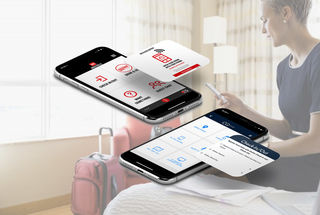How Hotels Can Bring Their Operations A-Game With Mobile

The human nervous system controls everything our bodies do and the way we experience the world around us. There's the brain—the central operations. Separate from the brain, the spinal cord is the messaging system that allows your brain to communicate with your body. Then there are, of course, nerve cells everywhere that take those messages throughout your body, allowing it to do the things you want.
When considering hotels, I think about the brain as the back-of-house; the nerve cells are the staff positioned all over the property delivering guest service; and the spinal cord is how the back-of-the-house communicates with staff across the property, telling them what they need to do in order to execute the ideal experience. The messaging system—that's your mobile interface, the spinal cord that connects ideas with execution across a wide number of people. Think of it like an essential communication system that creates operational efficiencies.
A report by YouGov showed that 38% of guests said the front desk takes too long to complete requests. Thirty-one percent (31%) said that delays in service from hotel staff are among the most frustrating part of hotel stays (Hotel Management). Both of these issues are fundamentally about the need for increased efficiency and better communication strategies.
Let's look at the ways the mobile interfaces can create efficiencies:
- Increasingly, staff prefer to communicate via text. Millennials comprise the highest percentage of the workforce now. By and large, they prefer texting to any other mode of communication. The phone call feature on a smartphone is the fifth most used app now if you need evidence of how little most people like to use voice (Forbes). In hotels, texting or chat for internal communications offers immediacy, as well as time to craft the right message. It can also be tracked, if desired or necessary. Implementing mobile communications speeds up workflow, which means that tasks are communicated and handled more quickly, and staff has more time to deal with the meaningful issues and problems that require the personal touch.
- Faster communication with guests and the resolution of problems. When guests can communicate via chat or texting, issues are resolved much more quickly. Not only does the issue get reported immediately (and with no hassle), staff can mobilize without tracking one another down physically. So when a guest alerts the front desk about a housekeeping issue and housekeeping is occupied cleaning rooms, pulling them away to resolve the issue can happen on the fly. And we know that guests with problems resolved quickly and efficiently typically rate a hotel higher than those with no problems at all.
- Expedited food and beverage ordering. Food and beverage has long been a challenge for hotels, namely because of unpredictable staffing needs and the effort and time required to deliver. Mobile ordering creates efficiencies that make F&B more sustainable for hotels. Order requests happen with lightning speed. No one is required to take the order. And guests don't have to wait on hold, which still happens far too often during peak hours.
- Saves front-desk staff time with mobile check-in and keyless entry. This is a no-brainer these days. Fifty-three percent (53%) of millennials prefer to check in and out with their phones, while across generation, 40% prefer (YouGov). Allowing guests to bypass the front desk improves guest service (no more lines) and frees front desk staff to offer more hospitality when they aren't typing away behind a computer or processing keys.
- Faster room turnarounds with mobile checkout and automated housekeeping updates. When guests checkout via a mobile device, it shaves a substantial amount of time off of processing rooms. Consider just the time required for each guest to walk from their room on the 15th floor to the elevator to the front desk and the time at the front desk to checkout—easily 10 to 20 minutes for every single room. For properties that monetize early check-in, the time saved contributes not just to efficiency but also directly to the bottom line. (At least 74% of travelers are interested in paying extra for flexible check-in and checkout times, according to YouGov).
- Reduced in-room directory costs. The days of the print directory are numbered. By providing the in-room directory on a mobile app, hotels save on print costs in the short- and long-term. In-room directories are pricey to produce, and every time something on property changes, they become outdated. With the directory available via mobile, guests can more easily search for what they need (and wherever they are in the hotel) and the information can be updated with ease.
Any one of these efforts on its own creates a more streamlined operation; however, consider the ramifications of implementing all of them. For large operations, trimming minutes off of service across multiple departments, when there are hundreds of rooms involved, amounts to game-changing revenue added to the bottom line. For boutique properties, there's more revenue, but there's also the benefit of having a finely tuned machine, and guests notice.
About Runtriz™
Runtriz delivers magic moments utilizing an open guest service platform that enables guest service amplification. We strive to enhance both the staff and guest service experience to optimize their time. With over 2000 hotels in 120 countries covering 50 + languages, Runtriz has the knowledge and experience to support your hotels' digital and guest engagement goals. We help our partners increase guest service results be delivering what today's guests want. For more information, or to request a demo, please visit runtriz.com.

